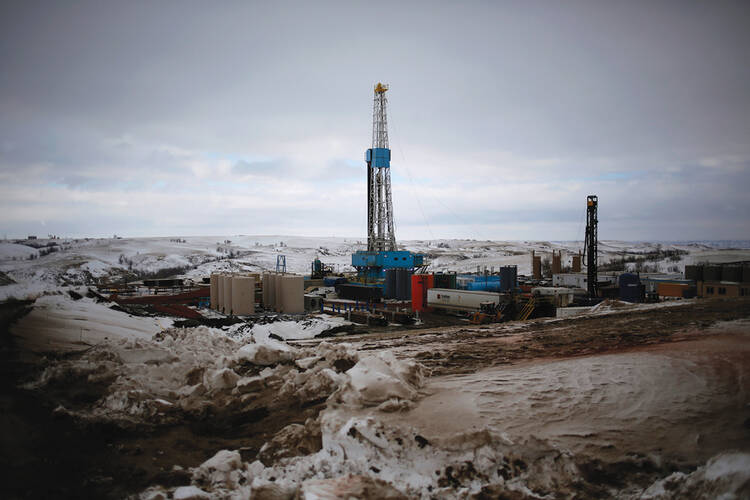The word greater is a tricky one. We frequently hear the phrase, “for the greater glory of God,” for example. As the de facto motto of the Society of Jesus, the expression appears across Jesuit institutions in the United States. I grew up around the Jesuits at Saint Louis University, went to Jesuit schools and am now a Jesuit brother. I try to find God in all things and strive for the greater glory of God.
There are plenty of things that work for the glory of God in the world. But greater is sneaky. It forces me to go deeper in my faith, to break past the surface. Building a world of justice—the kingdom of God—demands a radical depth. The quick answers and easy solutions may reach some glory, but usually not that “greater” one.
Fracking in Our Future?
In New York State the issue of hydraulic fracturing, or “fracking,” is a a sensitive one. Fracking is a method of drilling for natural gas. Supporters of the process favor natural gas as the clean energy of the future, a “bridge energy” to renewable solar and wind power. City buses tout natural gas on traveling billboards, and television commercials sing the benefits of the resource’s clean burning and low emissions. The very name even has natural in it! I was an early believer. But how do we go about retrieving this resource? That involves going a little deeper as well.
Fracking demands the use of millions of gallons of water, blasting sand and a scary cocktail of lead, benzenes, volatile organic compounds and other chemicals—many of which remain publicly unidentified because they are considered industry secrets. Companies drill down thousands of feet, below the water table. There the drilling continues in a horizontal direction, and the high-pressure injections of water, sand and solvents fractures rock and releases pockets of natural gas. The gas then rises to the surface along with about half of the chemicals and water that had been sent down. The recovered material must be carefully retained and restored. It sometimes is not.
Fracking advocates praise the new industry as an opportunity for job creation and energy independence. Television commercials supporting fracking promise new jobs, environmental sensitivity and a bright future. But fact-checks by Food and Water Watch, an organization with which I am a volunteer, reveal a far bleaker story of long-term minimal job growth and the potential for massive environmental degradation.
North Dakota is undergoing a fracking boom that is drawing thousands of workers and displacing current residents. National Geographic reports that “thousands of people are converging on the area, looking for work, looking for redemption, looking for trouble.” All this leaves me wondering—is hydraulic fracturing leading toward the greater glory? Is it contributing to building God’s kingdom or just a temporary, earthly one?
I find the beauty of the kingdom in nature. I discerned my vocation while hiking the Missouri River bluffs. My best family memories come from state and national parks. Heaven must be spectacular if it is more beautiful than the mysterious American mountains, plentiful lakes and bountiful plains I hold so dear. I can imagine few things uglier than roaring tanker trucks and gas burn-off spewing chemical pollution and soot in the Catskills the way the semis do that currently crowd North Dakota’s landscape. We would be fracking the Promised Land.
Unnatural Gas
Amid the promises of jobs, environmental stewardship and economic growth, I have to ask, “Is this truly for the greater glory of God?” Given the non-industry-funded studies I have seen, the answer is absolutely not.
The gas-burning required and encouraged by fracking contributes to climate change. A study in Nature reported that up to 9 percent of the methane produced in the Uinta Basin drilling fields in eastern Utah was lost through leakage into the atmosphere. The U.S. Environmental Protection Agency reports that “pound for pound, the comparative impact of methane on climate change is over 20 times greater than CO2.” With an international water crisis looming, the waste of water required by fracking is disturbing, and the many possible health impacts of the industry are disconcerting. We cannot afford to take the route of hydraulic fracturing.
After a decade-long expansion of fracking, we have already begun to see direct and indirect effects across the country, both on the environment and on people. Chemical and gas spills haunt the land, endangering the very livelihood of farmers and ranchers. On some rural properties, residents and their livestock must drink water brought in by tanker trucks because fracking has contaminated the ground water.
We cannot afford to lose the farms, the ranches or the water. We cannot afford the burning of more fossil fuels. Where does this leave us then? How do we search out the greater glory? How do we build the kingdom?
I do not have all of those answers. I look toward a clean energy future of solar and wind power and know it will take real commitment and dedication. Other countries have begun making this commitment. In the United States, we have found excuses to lag behind, to develop “transition fuels” and exhaust every last drop of oil before we open up to other forms of energy. The greater glory demands that we put effort, research and sacrifice into clean energy.
These big changes can be somewhat scary and daunting; they can be difficult. But they are also necessary, good and just. I refuse to give a broken world to the next generation, a world in which we might one day hold up a photo of a beautiful dairy farm knowing the land it once rested upon is now littered with rusting rigs. I will not frack the Promised Land. I will fight for the greater glory of God.








